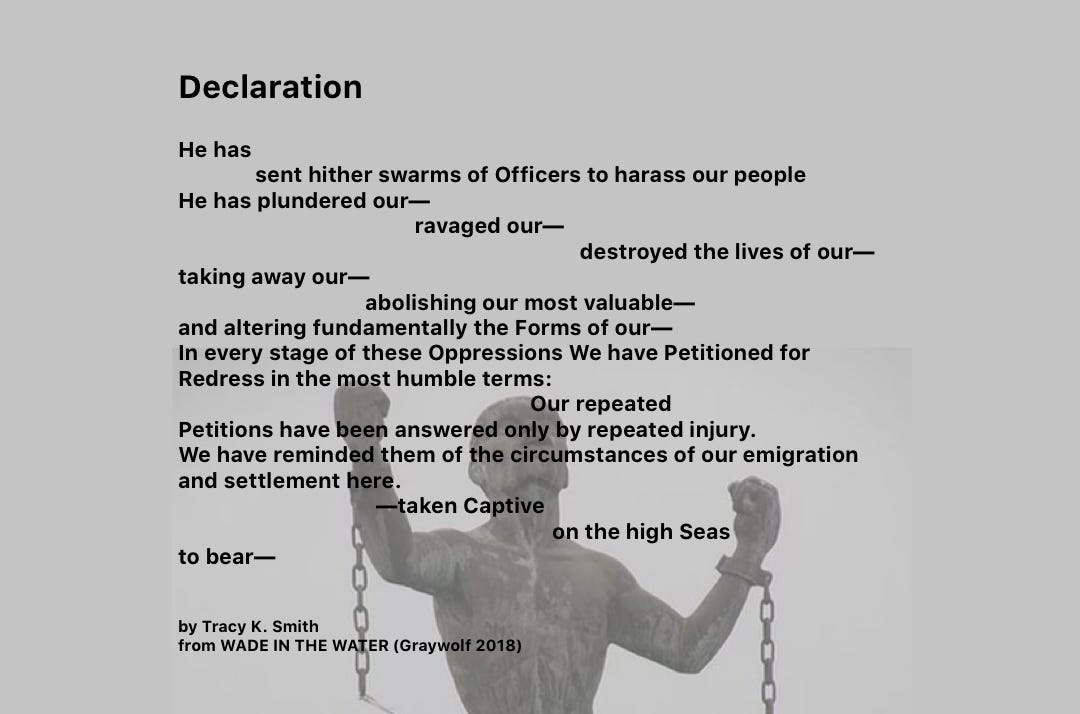- Home
- Process Worldview
- Community
- Art and Music
- Whitehead and Process Thinking
- Podcasts
- Spirituality
- Ecological Civilization
- Education
- Contact
- Social Justice
- Science
- Animals
- Sacred Poems
- Whitehead Videos
- Index of All Titles
- Practicing Process Thought
- Process Spirituality: A Spiritual Alphabet
- Recent Posts
The Metaphysics of Erasure Poetry
Every moment of experience is an activity of assimilating numerous influences from the past into a singular subjective unity. Whitehead speaks of this activity and this unity as concrescence: a becoming concrete of what was previously indeterminate. This unity then becomes a moment in history, to be gathered by successive moments. Whitehead speaks of this succession as transition. Together, concrescence and transition are what he means by "process."
The concrescing process of gathering is inherently creative. It can conform to the past or engage in a creative transformation of the past, leading to the emergence of something new. Even if it conforms to the past, it (the concrescence) still adds something new to the universe, namely itself.
One significant form of creative transformation is erasure—an act of deliberate removal. This involves selectively erasing portions of the past to unveil novel or forgotten aspects, allowing them to resurface and present themselves. Erasure can be constructive or destructive. Destructive erasure hides from the truth of the past. Constructive erasure reveals the truth in an indirect way, serving as a gateway to new possibilities.
A vivid illustration of constructive erasure is found in erasure poetry. Through this art form, segments of an existing text are erased, giving rise to fresh meanings from what remains. Consider Tracy K. Smith's erasure of certain words from the Declaration of Independence. This deliberate act not only uncovers previously 'erased' voices but also offers them a chance to be remembered and, perhaps, even heard once again. In essence, she performs an erasure of erasure, an act that amplifies the voices that were once suppressed.
- Jay McDaniel
The concrescing process of gathering is inherently creative. It can conform to the past or engage in a creative transformation of the past, leading to the emergence of something new. Even if it conforms to the past, it (the concrescence) still adds something new to the universe, namely itself.
One significant form of creative transformation is erasure—an act of deliberate removal. This involves selectively erasing portions of the past to unveil novel or forgotten aspects, allowing them to resurface and present themselves. Erasure can be constructive or destructive. Destructive erasure hides from the truth of the past. Constructive erasure reveals the truth in an indirect way, serving as a gateway to new possibilities.
A vivid illustration of constructive erasure is found in erasure poetry. Through this art form, segments of an existing text are erased, giving rise to fresh meanings from what remains. Consider Tracy K. Smith's erasure of certain words from the Declaration of Independence. This deliberate act not only uncovers previously 'erased' voices but also offers them a chance to be remembered and, perhaps, even heard once again. In essence, she performs an erasure of erasure, an act that amplifies the voices that were once suppressed.
- Jay McDaniel
Theology of Erasure
Consider the way in which the Lure of God is at work in poetry. Sometimes it is an inwardly felt beckoning to erase words from a given text for the sake of allowing something new to emerge: new voices, for example. It is to take a well known text filled with assumptions about who counts and who doesn't, and erasing aspects of that text so that the assumptions become clear. In this way, those who were erased from the forgotten and speak through the erasure. The erasure makes possible their voice.
This is what Tracy K. Smith accomplishes in "Declaration." Through her erasure of passages from the Declaration, we find ourselves remembering those who were left out, specifically the slaves who played a vital role in building the nation and supporting the wealth of the authors of the declaration. If we have ears to hear, we cultivate a sense of connection with the erased, the unnamed, and the seemingly dispensable. Our own imaginations, too, are brought alive through erasure.
A theological truth becomes clear: creativity is not creation out of nothing, it is creating out of preexisting materials in novel ways. Sometimes, even for God, it is leaving things out so that something new can emerge. The creativity is in the erasure of existing assumptions, making space for the abused, the forsaken, and the forgotten. Blessed are the left out, for they shall inherit the earth.
- Jay McDaniel
This is what Tracy K. Smith accomplishes in "Declaration." Through her erasure of passages from the Declaration, we find ourselves remembering those who were left out, specifically the slaves who played a vital role in building the nation and supporting the wealth of the authors of the declaration. If we have ears to hear, we cultivate a sense of connection with the erased, the unnamed, and the seemingly dispensable. Our own imaginations, too, are brought alive through erasure.
A theological truth becomes clear: creativity is not creation out of nothing, it is creating out of preexisting materials in novel ways. Sometimes, even for God, it is leaving things out so that something new can emerge. The creativity is in the erasure of existing assumptions, making space for the abused, the forsaken, and the forgotten. Blessed are the left out, for they shall inherit the earth.
- Jay McDaniel
An Analysis of the Poem
by Michael Mingo
The first thing to note about “Declaration” is that the words themselves are not of Tracy K. Smith’s creation. Instead, “Declaration” is an example of erasure poetry, a form of found poetry in which the poet takes a pre-existing text and removes (“erases”) some or most of the original words, such that the remaining words form a new composition, often one that comments on the original text. Though erasure poetry doesn’t really involve writing as we normally conceive of it, it still requires a kind of creative vision: the ability to see new contexts for old words, to find subversive potentials in someone else’s language.
You probably know where we’re going with this, but to make it explicit: the country that extolled the equality and inalienable rights of “all men” permitted and was built on chattel slavery. The men who stuck their necks out in accusing George III of tyranny practiced their own tyranny upon the black slaves they and their fellow citizens owned as property. It is the unpardonable hypocrisy that has continued to haunt the United States from its inception to the present. One cannot in good conscience read the Declaration of Independence without mentally raising that objection to it.
A Discussion of the Poem
Joanne Diaz and Abram Van Engen
Joanne Diaz is a professor of English and a poet at Illinois Wesleyan University.
Abram Van Engen is an English professor at Washington University in St. Louis.
Abram Van Engen is an English professor at Washington University in St. Louis.
About Tracy K. Smith
"Tracy K. Smith was born in Massachusetts and raised in northern California. She earned a BA from Harvard University and an MFA in creative writing from Columbia University. From 1997 to 1999 she held a Stegner fellowship at Stanford University. Smith is the author of four books of poetry: The Body's Question (2003), which won the Cave Canem prize for the best first book by an African-American poet; Duende (2007), winner of the James Laughlin Award and the Essense Literary Award; Life on Mars (2011), winner of the Pulitzer Prize for Poetry; and Wade in the Water (2018). In 2014 she was awarded the Academy of American Poets fellowship. She has also written a memoir, Ordinary Light (2015), which was a finalist for the National Book Award in nonfiction.
In June 2017, Smith was named U.S. poet laureate...more
- from the Poetry Foundation

